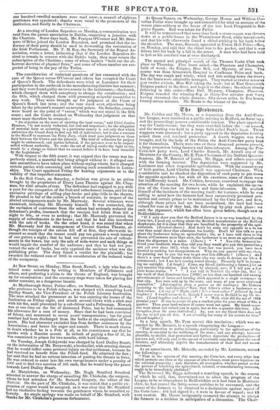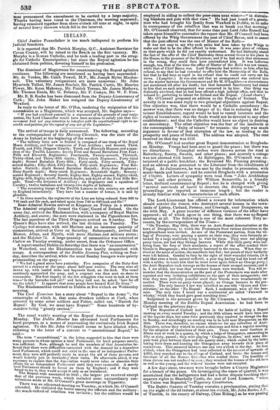gbt likobintts.
Mr. Cobden and Mr. Moore, as a deputation from the Anti-Corn- law League, were received at a public meeting in Bedford, on Satur lay ; and the proceedings possess considerable interest. The place appointed was the Castle-rooms ; but they were over-full before the lour named, and the meeting was held in a large field called Peck's Meet. Three waggons were procured ; but a party opposed to the deputation forcibly
seized them and retained possession. A fourth waggon was thea brought, and by the help of the Police the Anti-Corn-law party kept it for themselves. There were two or three thousand persons present, a large proportion being farmers and farm-labourers. Among the Pro- Corn-law party were, Lord Charles Russell, Mr. Anstell one of the Members for the County, Mr. R. Pym Chairman of the Bedford Quarter- Sessions, Mr. W. Bennett of Luton, Mr. Biggs, and others connected with the farming interest. The deputation were supported by Mr. Lattimore and other respectable agriculturists. With the concurrence of both parties, Lord Charles Russell was appointed Chairman. With. considerable tact he checked the disposition of each party to put dowa the opposite speakers ; but with all his exertions, some of them were but indifferently heard. Mr. Cobden, however, contrived to engage the attention of the meeting for two hours, while he explained the opera- tion of the Corn-law on farmers and farm-labourers. He availed' himself of the incidents of the meeting itself: for instance, while he was calling to mind how the farmers had been successively promised pro- tection and certain prices to be maintained by the Corn-law, and how, although those prices had not been maintained, the land had been valued for rent as if they had, the following by-play took place : we omit the argument, which has often been given before, though new to Bedfordshire-- "If I only show you that the Bedford farmer is in no way benefited by the Corn-law, I need say nothing about the Bedford manufacturer or the Bedford shopkeeper, for it is clear that they are benefited by the prosperity of the agri- culturists. (Ironical cheers.) And don't let some one opposite in a be ter coat than usual cheer that admission too hastily. Don't let him talk to you about the landowner being an agriculturist ; for, as I have told them in ths House of Commons more than once, the landowner is no more an agriculturist than the shipowner is a sailor. (Cheers.) * * You (the farmers) be- lieved your landlords when they told you they would give you this protection ; and yet ever since 1815, when the Corn-law was passed, you have been doomed to nothing but disappointment. Why do you quarrel with me, then, for pointing out to you the way to get over this difficulty? (Cheers.) Alit there's a sour-faced farmer down there who was ready to devour me when I, commenced ; but I see he's coming round already. Presently he'll be huzza- ing me outright. (A laugh.) Come, my friend, (addressing a farmer,) let us just consider this matter. And don't be alarmed, now, if I tell you a few plain home-truths. • * * I was told in Norwich the other day, that la one week of that disastrous time [1822] no less than one hundred and twenty advertisements of farms and farming stock appeared in a single newspaper in that city. You were sold up by the score, and many of you never recovered yourselves." (Interruption from a person on the hustings.) Mr. Cobden (pointing to the individual)—" Now, that fellow's either a landowner or a land-valuer. (A cry of " Rig/it, right ! he's a land-valuer !"followed by loud laughter.) I would swear to it, though I never was in Bedford in my life be- fore. (Loud laughter and cheers.) • • Well, what did the act of 1823 promise you ? It was to secure to you a market-price for your wheat of 64a. a quarter. Then your land.valuers of course went out again. My friend oppo- site went about and valued you in again, but at 6-1s, a quarter this time. (1a- terruption from the same individual.) Ay, you see my friend there does not like me to tell you all this. I am revealing too many of his secrets for him." (Loud laughter.) In a long speech, Mr. Pym moved this resolution ; which was se- conded by Mr. Bennett, in a speech vituperating the League— "Thai protection to native industry, particularly to the agriculture of tho country, is essential to the wellbeing of the state ; and any attempt, however plausible, to abolish that protection and further depreciate the production. ,.f* our own soil, will only end in the spread of inevitable ruin throughout the rural districts, and ultimately deprive the manufacturers of their best and steed customers."
As an amendment, Mr. Metcalfe, seconded by Mr. Lattimore, moved the following-
" That in the opinion of this meeting, the Corn-law, and every other law which protects one class at the expense of other classes, must prove injuriou to the national prosperity ; and, therefore, all monopolies, whether passed under the pretext of benefiting the agricultural, colonial, or manufacturing interests, ought to be immediately abolished." The Reverend Mr. Biggs delivered a rambling speech, in the course of which he said, that, determined not to allow the progress of the League, to be so triumphant in Bedfordshire as it had been in Hertford- shire, he had caused the thirty-seven parishes to be canvassed, and the names of the farmers to be obtained to a declaration against repeal of the Corn-laws : 486 had signed it ; 6 were in favour of repeal ; and 1$ were neutral. Mr. Moore indignantly censured the attempt to pledge the farmers to a decision in anticipation of a discussion. The Chair-
man pronounced the amendment to be carried by a large majority. Thanks having been voted to the Chairman, the meeting separated ; having remained together from three o'clock till nine at night, in spite of several heavy showers which fell in the interval.



























 Previous page
Previous page